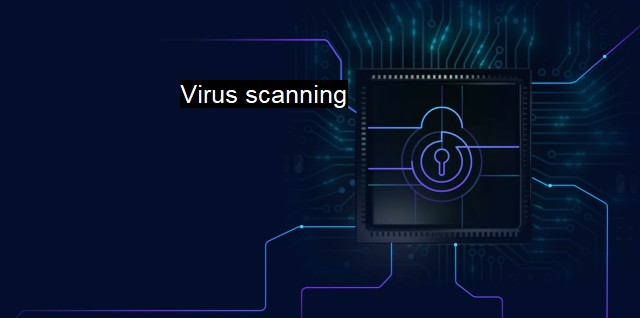What is Virus scanning?
The Importance of Virus Scanning in Cybersecurity: Understanding, Types, and Methods
Virus scanning is a crucial component of cybersecurity practices which involves examining computer systems, files, and software for the detection of malicious programs known as viruses. It seeks to identify, isolate, and eventually eliminate viruses that have the potential to disrupt operations, steal information, manipulate data, and create backdoors for other vulnerabilities in a computer network or individual computers.Just as bacteria and viruses can invade the human body and lead to unwanted sickness, cyber threats also pose similar risks to the health of computer systems, impacting their functionality and the integrity of the data they hold. Virus scanning is akin to a regular health check-up that ensures that all parts of a computer system are working optimally without any intrusions from harmful entities.
Critical to both personal and business applications, virus scanning software or antivirus software is essential software tools designed to shield data and systems from damage caused by cyber threats. These tools constitute a barrier between the computer system and potential threats, working tirelessly to keep out infectious malware, prevent virus propagation, and if necessary, neutralize any existing threats.
Virus scanning typically works on two fundamental approaches: scanning and heuristic analysis. Scanning is an approach where the antivirus software checks the binary pattern or "signature" of a file against a database of known threat signatures. When a match gets identified, the software flags it as a potential virus.
Considering the vast and ever-evolving cyber threat landscape, relying solely on known virus signatures is insufficient since new viruses constantly get produced, and each comes with its unique signature. Therefore, antivirus software often includes heuristic analysis that can detect potentially harmful behavior characteristic of new unknown viruses. This process involves checking code or programs for suspicious operations and patterns, thus providing protection against emerging and zero-day threats, whose signatures are not yet in the antivirus software's database.
The practice of virus scanning becomes even more significant considering the sophisticated landscape of modern cyber threats. Today, viruses have grown far more advanced than simple self-replicating programs causing mild annoyance. They have become tools for cybercrime, causing severe harm such as stealing sensitive data, taking over computer resources, or even orchestrating large-scale network attacks.
Contrary to a common belief, virus scanning does not only keep your computers running smoothly but also safeguards data. Increasing cases of identity theft, monetary loss, and fear of sensitive and personal data compromise have served as strong drivers for people to invest in antivirus software, making virus scanning a part of their routine digital lives.
When successfully administering regular virus scans, individuals and organizations can navigate the digital landscape with increased confidence. Regular virus scanning acts as a proactive shield, constantly checking for potential threats and mitigating them before they could harm the health and stability of the system. This way, critical system resources can keep focusing on their primary functions rather than dealing with the distraction of eliminating cyber threats.
Many antivirus software packages come with additional features intended to enhance the user's online safety. Some of these features include email protection, firewall, intrusion prevention systems, web protection, and antispam, all working together to provide an all-encompassing protection shield against a broad range of cyber threats.
In an era where users’ work, communication, and financial transactions are moving increasingly to the digital platform, virus scanning is no longer an optional extra but an essential necessity for maintaining the robust health and functionality of computer systems on which modern life heavily depends. Virus scanning effectively eradicates the risk of cyber threats, ultimately ensuring a safe, secure, and uninterrupted digital experience for users.

Virus scanning FAQs
What is virus scanning?
Virus scanning is the process of examining files or software on a computer system to identify and remove any malware or viruses that may be present. It is an important measure in cybersecurity to prevent potential cyber-attacks.Are all antivirus programs the same in terms of virus scanning capabilities?
No, different antivirus programs have varying degrees of virus scanning capabilities. Some may be more effective at detecting certain types of viruses than others. It's important to choose an antivirus program that fits your specific needs and provides comprehensive protection.How often should I run a virus scan on my computer system?
It is recommended to run a virus scan on your computer system at least once a week, or whenever you suspect that your system has been compromised. Regular scanning helps to ensure that your system is protected from potential threats and viruses.Can virus scanning programs detect all types of viruses and malware?
No, not all antivirus programs can detect every type of virus or malware. Some viruses may be designed to evade detection by certain antivirus programs. It's important to regularly update your antivirus software and install the latest virus definitions to improve the detection and protection against new viruses and malware.| | A | | | B | | | C | | | D | | | E | | | F | | | G | | | H | | | I | | | J | | | K | | | L | | | M | |
| | N | | | O | | | P | | | Q | | | R | | | S | | | T | | | U | | | V | | | W | | | X | | | Y | | | Z | |
| | 1 | | | 2 | | | 3 | | | 4 | | | 7 | | | 8 | | |||||||